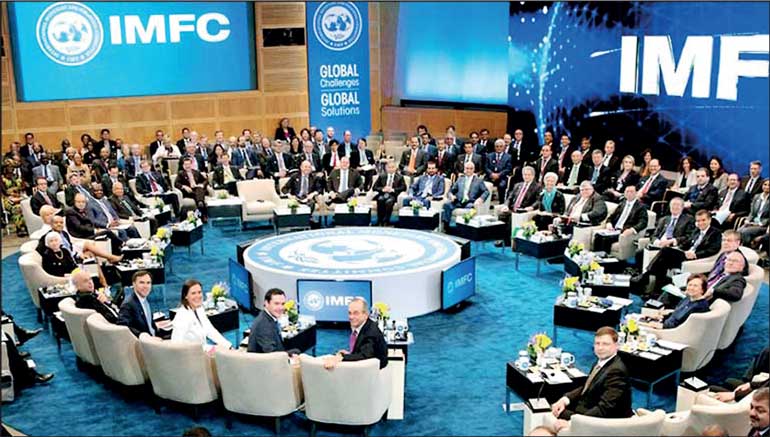Friday Feb 20, 2026
Friday Feb 20, 2026
Friday, 31 December 2021 00:08 - - {{hitsCtrl.values.hits}}

IMF has been made into a ‘Goni Billa/Grease Yaka’ by these ministers and the governor, and portrayed as an international institution waiting for an opportunity to strike, assist with regime change, go for the kill and swallow the sovereignty, independence and resources of the people in favour of the rich and powerful Western nations
 At this challenging time for Sri Lanka, economically and socially, with high magnitude risks of precipitating a crisis
At this challenging time for Sri Lanka, economically and socially, with high magnitude risks of precipitating a crisis
that can easily destabilise the whole country, impoverish it and drive to starvation the poor and vulnerable segments and even lead to a national calamity following social unrest, are some Ministers and the Governor, misleading the citizens and even their superiors in governance? If so, do they not realise the impending risks, most recent examples from Lebanon and yet continue to mislead and take the country down a dangerous path, where one slip can mean disaster for the majority of the citizens and those yet unborn?
IMF has been made into a ‘Goni Billa/Grease Yaka’ by these ministers and the governor, and portrayed as an international institution waiting for an opportunity to strike, assist with regime change, go for the kill and swallow the sovereignty, independence and resources of the people in favour of the rich and powerful Western nations! This plan they make out will be achieved by ‘IMF conditionality’, described more or less as a suicide note cum last will in favour of the IMF.
To the contrary, this is how IMF describes ‘Conditionality1’ – “When a country borrows from the IMF, its government agrees to adjust its economic policies to overcome the problems that led it to seek financial aid. These policy adjustments are conditions for IMF loans and serve to ensure that the country will be able to repay the IMF. This system of conditionality is designed to promote national ownership of strong and effective policies.”
“Conditionality covers the design of IMF-supported programs—that is, macroeconomic and structural policies—and the specific tools used to monitor progress toward goals outlined by the country in cooperation with the IMF. Conditionality helps countries solve balance-of-payments problems without resorting to measures that are harmful to national or international prosperity. At the same time, the measures are meant to safeguard IMF resources by ensuring that the country’s balance of payments will be strong enough to permit it to repay the loan.
“The member country has primary responsibility for selecting, designing, and implementing policies to make the IMF-supported program successful. The program is described in a letter of intent, which often has a memorandum of economic and financial policies attached. The program’s objectives and policies depend on a country’s circumstances. But the overarching goal is always to restore or maintain balance-of-payments viability and macroeconomic stability while setting the stage for sustained, high-quality growth and, in low-income countries, reducing poverty.”
In addition, ‘Guidance note on IMF engagement on social safeguards in low-income countries2’ of 14 June 2018 refers to;
“The role of social safeguards in protecting vulnerable groups is an important element of the Fund’s engagement with low-income countries (LICs).
Reducing poverty, and more broadly promoting inclusive growth, helps support economic and political stability. For these reasons, achieving strong and durable poverty reduction was established as a key objective for Fund programs supported by the Poverty Reduction and Growth Trust (PRGT) and Policy Support Instrument (PSI)
Social safeguards represent a key policy tool to achieve this objective, and thus have an important role in both the design of LIC programs and policy discussions with LICs in Fund surveillance.
For the purposes of this note, social safeguards comprise the following:
The key concepts described above are amplified as:
Brookings Institute article titled ‘Managing developing countries’ sovereign debt’3 states: “The IMF determined early in 2020 that 29 of its most vulnerable members will be exempted from amortisation and interest on their debts with the organisation, during an initial period of six months that was later extended to 24 months (until April 13, 2022).
In turn, the G-20 offered a suspension of the debt service of the countries of the International Development Association (IDA) for the year 2020. This Debt Service Suspension Initiative (DSSI) potentially benefited 73 countries, but did not cancel the debt, which also continued to earn interest.
The corresponding decision was adopted by the Paris Club and other major creditors, especially China. However, private creditors did not adopt it, as requested by the G-20, and some debtor countries did not use it for fear that their sovereign credit ratings would be negatively affected.
The IMF proposals underscored the need to improve the existing institutional mechanism—the so-called “contractual arrangement” based on the collective action clauses included in bond contracts—which was redesigned in 2014, and highlighting at the same time the growing problems associated with non-bond and collateralised debts, and the lack of transparency in this field.
It should be noted that the other possibility that has been on the table over the past two decades is the creation of a new institution that would support sovereign debt renegotiations. An additional possibility is doing so in the context of the IMF, as was attempted at the beginning of the century, if the debt panel in charge is independent from the board of the institution. The need for such a reform, called “statutory” in the debates, has been championed again by the UNCTAD during the current crisis.”
The above evidence supports the assertion that some ministers and the governor created ‘Goni Billa/Grease Yaka’ picture of the IMF, is only a figment of their imagination or a picture painted with personal or political interests.
Footnotes
1https://www.imf.org/en/About/Factsheets/Sheets/2016/08/02/21/28/IMF-Conditionality
2file:///C:/Users/User/Downloads/pp061418social-safeguards-guidance-note.pdf
3March 2021-Jose Antonio Ocampo- Chair - U.N. Committee for Development Policy
Professor and Director, Economic and Political Development Concentration, School for International and Public Affairs - Columbia University